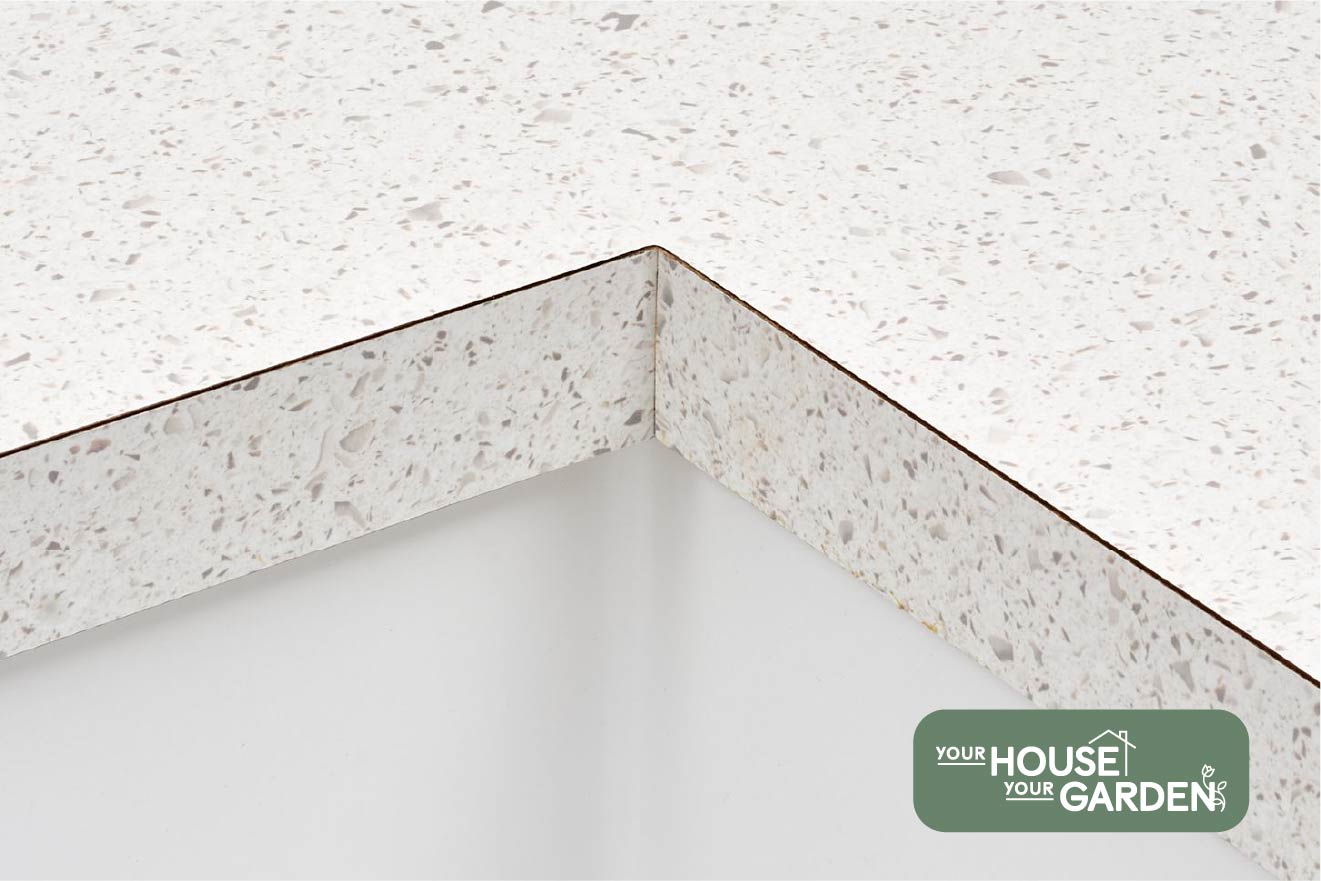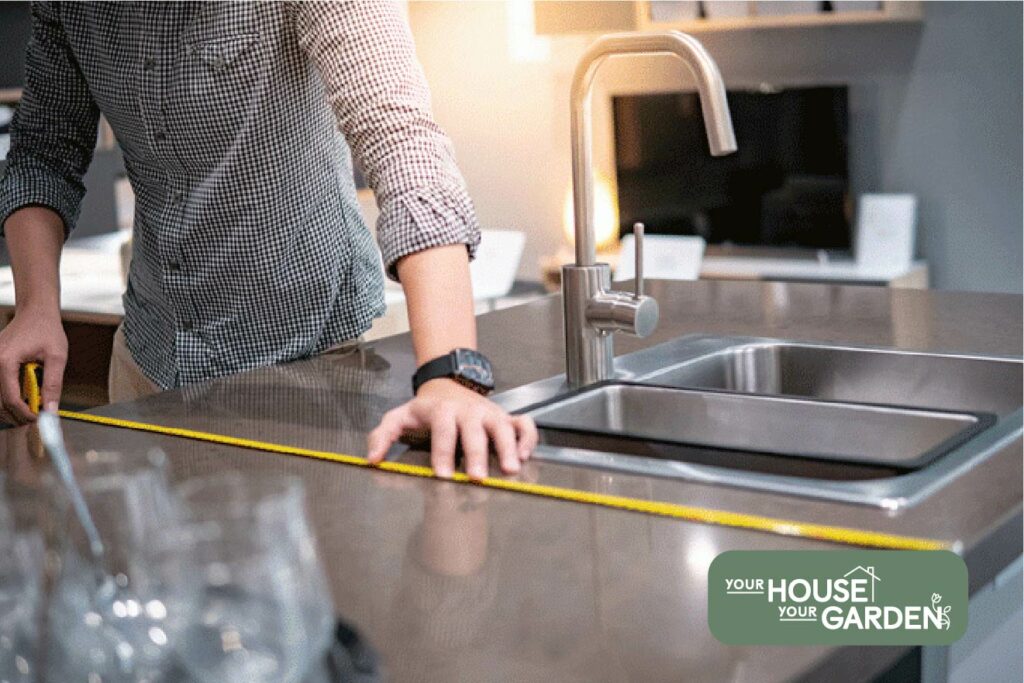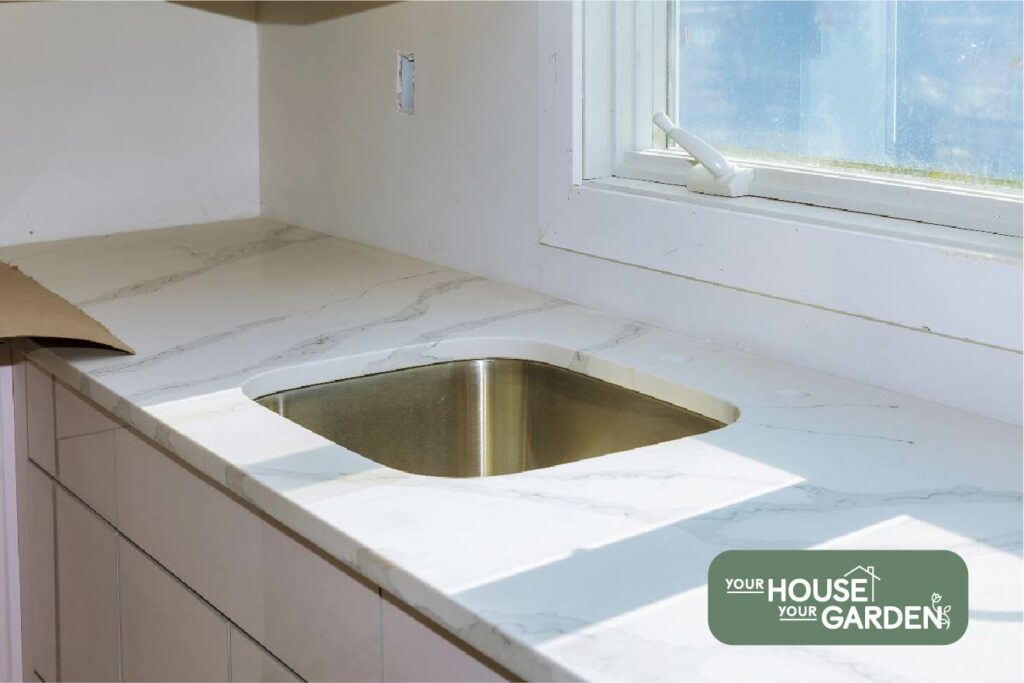Corian vs Laminate Countertops
Home » Home Remodeling » Kitchen Countertops » Corian vs Laminate Countertops
Searching for the right counter for your kitchen or bathrooms? When on the hunt for the best possible material that will be the focal point of a space, complement your custom kitchen cabinets or backsplash, and not break the bank, it’s good practice to weigh your options. Perhaps you’ve already considered two of the most affordable options out there but aren’t sure which one to commit to. Corian vs laminate countertops: here’s what you need to know!
Corian vs Laminate: The Difference
What is Corian?
Corian, which is also called solid surface, is recognized as the first man-made countertop material. In 1971, Corian became known as an engineered stone material designed to mimic the look and function of natural stone surfaces like quartz countertops or granite countertops. However, unlike these top-end materials, Corian “solid surface” countertops are composed of a natural mineral blend and polyester resins. Solid surfaces are non-porous which makes the entire countertop impervious to liquids and naturally stain-resistant. A solid surface countertop does not require regular sealing and is an affordable alternative to other countertop materials.
What is Laminate?
Laminate is one of the most popular countertop materials that was introduced in the late 1940s. Laminate was a popular choice among homeowners from 1950 to 1960 as an alternative to wood surfaces like butcher block and natural stone surfaces such as marble and granite. However, plastic laminates became less popular and were considered cheap looking compared to Corian counters as well as more expensive countertop surfaces (e.g., quartz, marble, and granite countertops.)
However, plastic laminate countertops are no longer regarded as outdated today and are often used in kitchen remodeling projects in order for an interior designer to match your existing cabinets or incoming backsplash tile. Modern laminate countertops have come a long way since Formica debuted the material. So what makes laminates better nowadays? Well, resins are laminated onto layers and layers of ordinary paper before a decorative layer is added. A melamine resin layer is then applied to seal everything in. Popular brands like Wilsonart and Formica may even use plywood or medium-density fiberboard (MDF) so that high-pressure laminates are more resistant to heat, and scratches, and more durable in general.

Pros and Cons
Each countertop material has its pros and cons and Corian and laminate are no different. Here’s a quick guide to both options:
Corian Countertops: Pros
Maintainable: Corian solid surface is a durable material for countertops and can handle even the most extreme stains. A Corian countertop does not require any sealing after being purchased and can easily be wiped down with warm, soapy water.
Can be Repaired: Another benefit of having solid surface countertops is that they can be repaired if they are scratched or chipped. Solid surfaces can be sanded down and repaired when accidents in the kitchen or bathroom happen.
Shapeable: Solid surface countertops are also interior design-friendly because they can be shaped into familiar rectangle kitchen countertops or curvy bathroom counters as well.
Affordable Price Point: The price difference between materials like wood, granite, and Corian is another reason to choose solid surfaces instead. A solid surface countertop can be manufactured to mimic natural stone and wood materials but be a more affordable counter.
Corian Countertops: Cons
Will Leave Visible Scratch Marks: While patterns and dark solid surfacing slabs can be used so that future scratches are less visible, Corian is a counter material that if you scratch will leave visible marks.
Not a High-value Material: Corian countertops are quite budget-friendly and do not have unique patterns or mineral make-ups which is why it is not a material that will significantly increase the value of your home.
Prone to Discoloration: When a Corian counter is cleaned with strong chemicals (e.g., nail polish remover or paint remover) its original color will be altered.
Is Not Resistant to Extreme Heat: Compared to other materials, Corian is not completely heat-resistant. It can take on some heat but can tolerate hot pots or appliances up to 212ºF (100ºC.)
Laminate Countertops: Pros
One of the Most Affordable Countertop Materials: Formica has made laminate countertops one of the most budget-friendly options on the market. A laminate countertop can be manufactured to look like granite but will only cost a fraction of the natural stone’s price.
Versatile and Can Be Shaped Onto Any Surface: Laminate counters can be shaped into squares, rectangles, round shapes, and curved to create a seamless surface with the bathroom sink.
Can Be a DIY Installation Project: Laminate is manufactured to be light and not extremely expensive and delicate. This makes it easy to install laminate counters in the kitchen or bathroom.
Has a Wide Range of Colors, Finishes, etc.: Leading manufacturers like Formica have endless patterns, colors, finishes, and edge profiles available. All you need to do is choose the laminate countertop that best suits your style and will be incorporated well into a space.
Low-maintenance: There is no need for fancy cleaners needed for laminate. While you may need to occasionally wipe down a laminate counter and clean out crumbs in between the seams, this is a very low-maintenance option.
Laminate Countertops: Cons
Is Easily Scratched: Unfortunately, laminate is a surface that will easily scratch if it is used as a cutting board or when items with sharp edges are thrown onto it.
Will Chip: Additionally, laminate countertops will chip when accidents happen in the bathroom or kitchen.
Will Have Obvious Scorch Marks: Laminate is also prone to scorch marks when hot appliances, pots, or pans are placed directly onto the surface.
Will Delaminate Over Time: When repeatedly exposed to liquids like water, delamination will occur. Over time, the layers of laminate countertops will come apart because water is affecting the adhesive that keeps the surface together.
Comparing the Two
Looking at Corian vs laminate countertops side by side:
Aesthetic
Corian and laminate are very similar on the surface. This is because the print layer of laminate can mimic stone and wood or come in different colors, designs, and finishes. Similarly, a solid surface is designed to mimic natural stone and wood while also being available in plain colors.
The difference between the two in terms of aesthetics is their seams. Laminate has more visible seams between slabs or tile while if a solid surface slab is installed, seams are nearly invisible.
Cost
Corian is a more expensive option where it costs $45 to $65 per square foot. On the other hand, laminate countertops cost $20 to $65 per square foot whereas the more expensive option, high-pressure laminate, is manufactured to be more durable.
Composition
Corian and laminate may seem similar on the outside but are very different in terms of composition. Laminate is composed of layers and layers of resin, paper, plywood, or MDF. Corian is a mix of resin and minerals that are manufactured to create a non-porous surface with uniform composition through and through.
Lifespan
Warranty for solid surface counters will usually last up to 10 years. As for laminate, this type of counter can last as little as 10 years and as long as 20 years with proper care and maintenance. However, after this, the laminate will show noticeable wear and tear.
Maintenance
Corian and laminate are generally easy to take care of. Laminate can be sealed for extra protection, but both options do not require sealing. Regular cleaning with warm, soapy water is a great way to take care of your counters. It is also good practice to use a chopping board and heat pads. Neither of these counters is extremely heat-resistant due to the resins mixed into Corian and laminate.
Installation
Both options can be installed by professionals as you are renovating or remodeling rooms in your home but they can also be installed by yourself with the right tools and preparation.


